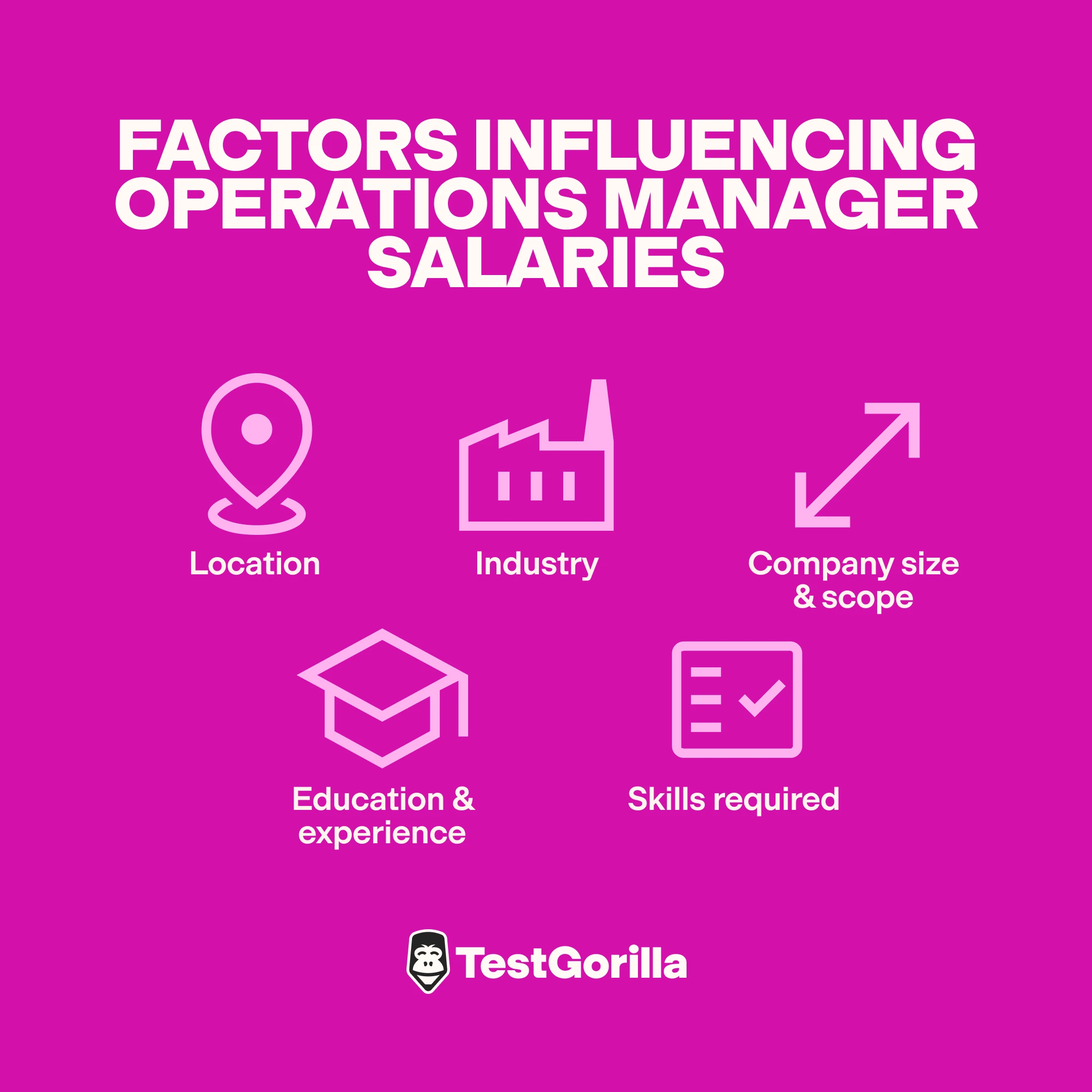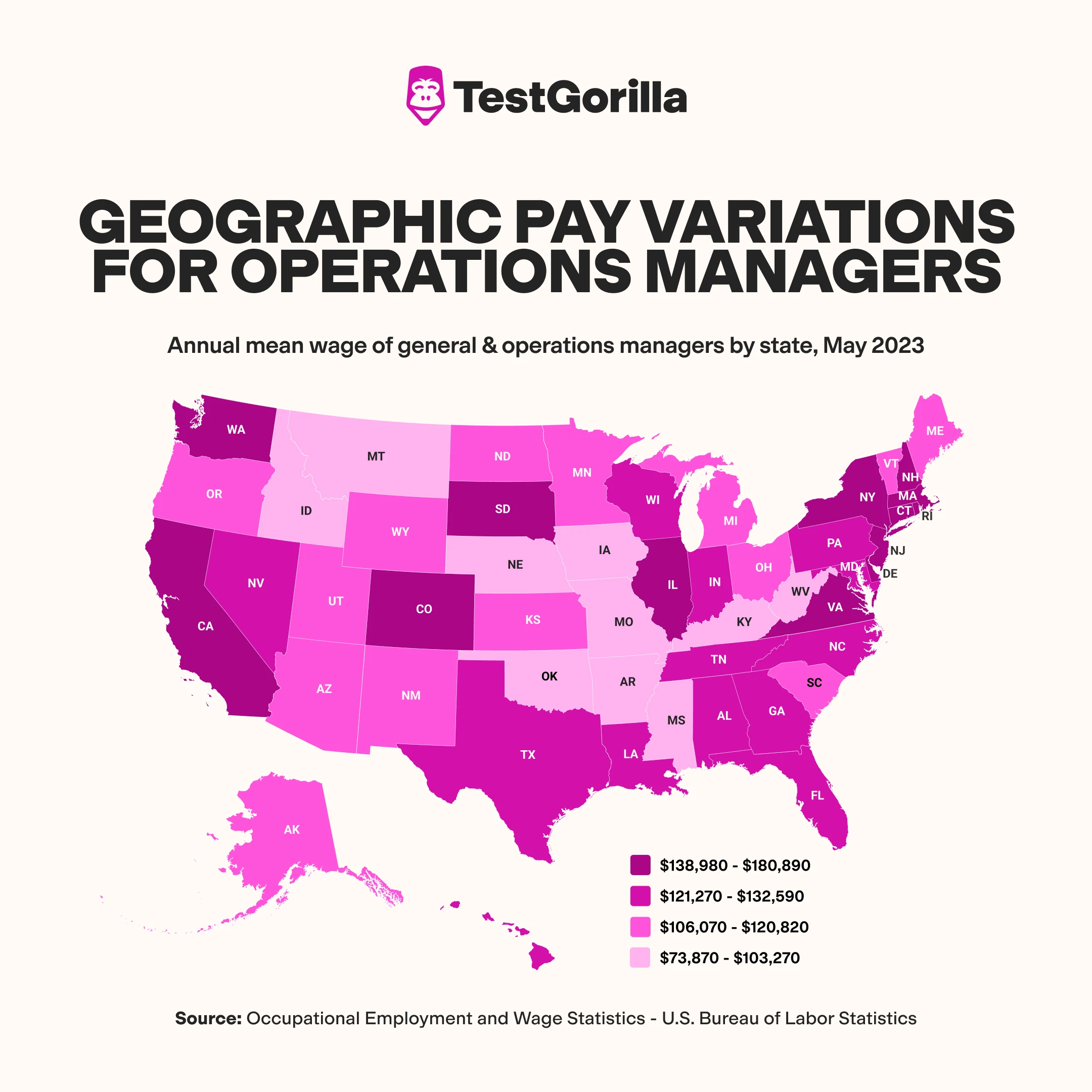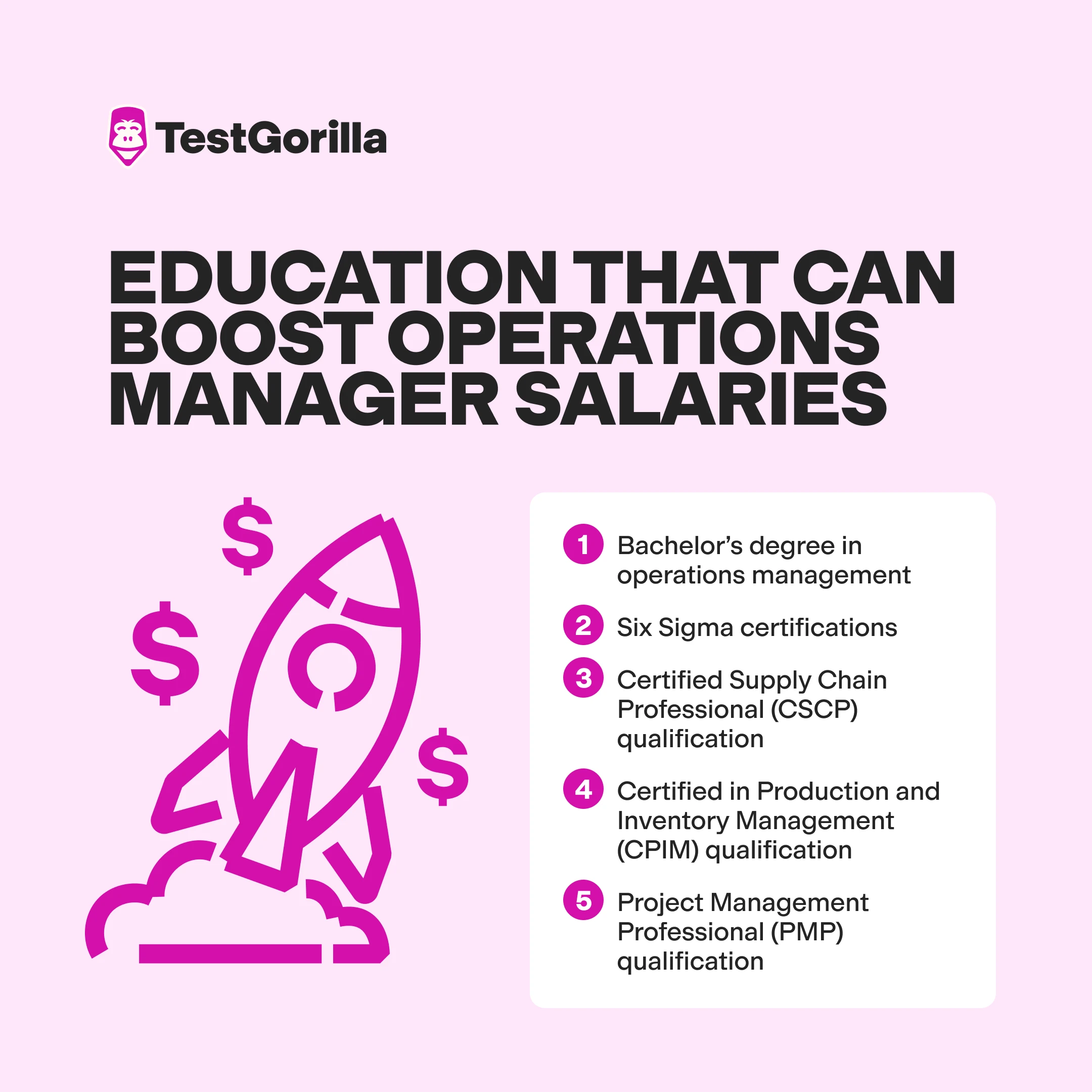According to the Bureau of Labor Statistics (BLS), employment in operations roles is expected to grow by 7% over the next decade, adding about 700,000 jobs across industries.
An increase in demand means an increase in competition for operations managers, and you must offer competitive salaries, attractive benefits, and clear opportunities for advancement to avoid losing out on top talent.
Luckily, we’re here to help with this.
In this guide, we break down the latest salary and benefits benchmarks so you’ll know exactly what to pay an operations manager to get them on board and retain them for the long haul.
How we researched this topic
With so many false and misleading sources of information online, we wanted to cut through the noise to bring you the most accurate data.
That’s why we’ve relied only on trusted government sources, such as the Bureau of Labor Statistics’s (BLS) latest Occupational Employment and Wage Statistics (OEWS) report for operations managers, which gathers data from over a million US businesses from November 2020 to May 2023. We’ve also used reputable websites like Forbes to give you a complete picture of operation managers’ wages, benefits, and more.
Key takeaways
The average annual salary for operations managers in the US is $129,330 per year or $62.18 per hour.
Wages vary depending on location, industry, company size, scope of role, and other factors.
Operations managers in New Jersey and those working in finance firms tend to earn more, while those living in Idaho and supporting food and accommodation businesses earn the least.
Certifications in Six Sigma, supply chain, and inventory management can boost operational managers’ earning potential.
National salary statistics for operations managers
Pay metric | Annual wage (USD) | Hourly wage (USD) |
Median | $101,280 | $48.69 |
Mean | $129,330 | $62.18 |
Top 10% earners | $232,110 | $111.59 |
Bottom 10% earners | $46,340 | $22.28 |
Median salary vs. mean salary
Here’s what mean and median are and why you need both.
The mean is the average number, calculated by adding all the wages and dividing the total by the number of operations managers. Means tend to be skewed by extremely high or low numbers, known as “outliers.”
The median is the middle number, calculated by listing all the wages in ascending or descending order and finding the middle value. Half of the operations managers earn more than this number, and half earn less.
Why are both important?
Imagine that most ops managers earn $100,000/year, but a few make over a million each. This can sway the mean to, for instance, $150,000/year – which provides valuable information about outliers but isn’t a fair view of what everyone else makes.
The median – more likely to stay around $100,000 – isn’t affected by outliers and is a better representation of operation manager wages.
Factors influencing salaries
To put the above numbers into context, you must understand why operations manager salaries differ from person to person. Here are some factors that influence wages:
Geographical location: Where operations managers work greatly influences their paychecks. For example, ops managers in New York typically earn more due to the high cost of living and the close proximity to high-paying sectors like finance. Meanwhile, Oklahoma’s cheaper rent and utilities, plus the prevalence of lower-paying industries like manufacturing, leads to a lower wage.
Industry: Wages vary across sectors, depending on the industry’s profitability, complexity, and stakes. For instance, operations managers in pharmaceuticals or investment banking tend to earn more than, say, retail because these are highly regulated and lucrative fields.
Company size and scope: A larger company – think a nationwide logistics firm – probably pays better due to the sheer volume, scale, and complexity of tasks. A smaller mom-and-pop shop or local cafe might pay a lower amount for more straightforward operations.
Skills required: An operations manager’s skills and expertise also affect their pay. For instance, someone with core skills, such as team scheduling or inventory checks, is likely paid less than someone who’s familiar with advanced data analytics, project management, and using tech to optimize workflows.
Education and experience: While an operations manager’s qualifications and years of experience don’t always translate to skill, credentialed candidates are usually better paid. For example, 10+ years of work experience, a certification, or an MBA would likely boost a candidate’s offer compared to a relatively junior ops manager with an undergraduate degree.
Geographic pay variations
Let’s explore how operations manager salaries differ across locations.
5 highest-paying states
The BLS report indicates that these are the five highest-paying US locations for operations managers, with average wages of $138,980-$180,890 per year:
New Jersey (NJ)
District of Columbia (DC)
Delaware (DE)
New York (NY)
Colorado (CO)
5 lowest-paying states
Conversely, these states have the lowest average wages for operations managers in the US – $73,870-$103,270 per year:
Idaho (ID)
Arkansas (AR)
West Virginia (WV)
Iowa (IA)
Kentucky (KY)
Why the differences across locations?
A big reason is the differences in living costs in each state. For instance, according to a recent Forbes report, the average rent in DC is $1,901 per month, while it’s $974 in Iowa.
Demand for the role is also a factor. For example, New Jersey’s proximity to business hubs like New York and Philadelphia signals a higher demand for ops managers compared to Kentucky.
Industry-specific pay data
We’ve crunched the data, and here are the mean annual wages – from lowest to highest – for operations managers in different industries.
Industry | Annual mean average |
Accommodation and food services | $90,461 |
Retail trade | $91,218 |
Other services (e.g., repairs and maintenance, laundry, religious organizations, labor unions, etc.) | $101,178 |
Agriculture, forestry, fishing, and hunting | $101,878 |
Arts, entertainment, and recreation | $109,107 |
Real estate and rental and leasing | $119,579 |
Management of companies and enterprises | $125,375 |
Transportation and warehousing | $125,638 |
Educational services | $125,790 |
Construction | $126,740 |
Cross-industry – private ownership only | $129,230 |
Cross-industry – private, federal, state, and local government | $129,330 |
Health care and social assistance | $129,831 |
Federal, state, and local government services (excluding schools, hospitals, and the United States Postal Service) | $131,152 |
Trade | $137,500 |
Manufacturing | $141,934 |
Information | $148,801 |
Professional, scientific, and technical services | $153,746 |
Utilities | $160,125 |
Mining | $162,820 |
Finance and insurance | $176,092 |
5 highest-paying industries
Let’s discuss why these industries usually pay more for ops managers.
Finance and insurance: Ops managers in this field keep clients’ financial transactions secure, tackle complex compliance, and manage confidential customer data. The high stakes ensure a higher salary.
Mining: This sector involves extracting minerals and resources, often from remote or hazardous areas, where a single mistake can be very costly. Ops managers must be skilled in dealing with large crews, heavy machinery, and strict safety protocols. This all contributes to a higher income.
Utilities: These operations managers keep essential services like electricity, water, and gas running. With errors affecting masses of people, the job is high-pressure and demands greater wages.
Professional, scientific, and technical services: Operations for specialized services (such as engineering, consulting, and scientific research) are complex. Therefore, they require employees who can manage multiple projects and provide top-quality services, which results in premium pay.
Information: This sector covers media, telecommunications, and data processing. Ops managers here earn more because of the complex tech processes, access to sensitive data, and need to drive innovation in a rapidly evolving market.
5 lowest-paying industries
Meanwhile, here’s why these fields are on the lower end for ops manager salaries:
Accommodation and food services: Profits margins in establishments like hotels, restaurants, and bars are often tight, leading to lower budgets and lower salaries for ops managers.
Retail trade: Like food services, retail is a low-margin space, and most standalone shops require limited special skills or expertise. That’s why operations managers in this sector usually command lower salaries.
Other services: This category covers smaller businesses and community-focused establishments, such as dry cleaning and laundry, repairs and maintenance, labor unions, and so on. These firms also operate on tight budgets, leading to lower salaries.
Agriculture, forestry, fishing, and hunting: Operations managers here take the hit on a stable salary base because much of the budget is used for temporary, seasonal, and migrant workers.
Arts, entertainment, and recreation: These industries usually rely on passion-driven workforces who seek these jobs for personal fulfillment. This, combined with lower overall budgets, translates into more modest salaries.
Pay by experience and education
Operation manager wages also vary by experience and education.
Average annual wage by years of experience
Entry level (0-2 years): $79,334
Mid-career (3-6 years): $85,619
Experienced (7+ years): $101,984
Education and certifications to boost earning potential
Depending on the sector and nature of work, ops managers with these credentials tend to command higher pay:
A Bachelor’s degree in operations management covers essential topics like logistics, process optimization, and quality control.
An MBA (Master of Business Administration) degree provides broader business and leadership skills, which boosts the management aspect of an ops manager’s role.
Six Sigma certifications, like green or black belts, demonstrate expertise in streamlining processes, reducing mistakes, and sticking to budgets, which are essential goals of operations management.
A Certified Supply Chain Professional (CSCP) qualification equips operations managers with specific supply chain strategy knowledge and technical expertise.
A Certified in Production and Inventory Management (CPIM) qualification focuses on inventory planning, scheduling, and manufacturing and logistics skills.
A Project Management Professional (PMP) qualification is a global standard that showcases the ability to work on multiple complex projects together.
The best insights on HR and recruitment, delivered to your inbox.
Biweekly updates. No spam. Unsubscribe any time.
Benefits beyond salary for operations managers
In addition to statutory benefits like paid time off, let’s look at some benefits you should offer when hiring operations managers:
Professional development: It’s not uncommon for operations managers to aspire to move to front-office or client-facing roles. Providing them with training, job shadowing, stretch assignments, mentorship, internal mobility, and other opportunities to upskill can be a huge attraction.
Bonuses, profit sharing, and stock options: Many industries, such as finance and tech, offer cash bonuses or profit sharing to incentivize and reward good performance. Additionally, startups operating on limited budgets provide stock options or equity to encourage long-term loyalty and a sense of ownership in company success.
Health insurance: Many companies partially or fully cover medical, dental, and vision insurance expenses for operations managers and their dependents. This is especially good for managers who work in remote or hazardous locations. However, considering the high cost of healthcare in the US, it’s an excellent selling point for all operations managers.
Retirement plans: Retirement plans – especially those you can match, like 401ks – can help your operations managers build a secure future. This is particularly useful for companies that can’t offer high salaries or big bonuses.
Flexible schedules or hybrid work: In many industries, operations can be managed online. So, offering flexibility is a great way to support ops managers’ work-life balance and give them the downtime they need. It’s extra beneficial for operations managers who provide round-the-clock support or work across time zones.
Hire top-notch operations managers with TestGorilla’s talent assessments
A competitive compensation package is a fantastic way to attract talented ops managers. But once applications come pouring in, you must find a way to shortlist the best candidates quickly. Otherwise, you risk losing them to faster competitors.
TestGorilla’s talent assessments are perfect for this. Our library of 350+ science-backed pre-employment tests lets you assess candidates on everything from hard and soft skills to cognitive abilities and behavioral attributes.
You can combine up to five tests to create a custom operations manager assessment. Here are the tests we recommend:
Hard skills
Soft skills and situational judgment
Communication
Cognitive skills
Critical Thinking test
Problem Solving test
Personality and culture
Enneagram, DISC, and other personality tests
Motivation test
Putting every candidate through these tests lets you screen applicants objectively and shortlist only the top ones for your operations manager interview. Plus, you can learn about their work preferences, cultural expectations, and motivations all in one go, making it easier to decide who to recruit and how to structure their offer best.
Register for a free account or schedule a live demo to explore TestGorilla today.
FAQs
Need more information? Check out our answers to some frequently asked questions.
What is the top pay for an operations manager?
The top 10% of operations managers in the US make an average of $232,110 per month or $111.69 per hour.
What is an operations manager in charge of?
An operations manager oversees and improves day-to-day processes and workflows, ensuring everything runs smoothly and according to budget.
You've scrolled this far
Why not try TestGorilla for free, and see what happens when you put skills first.





















